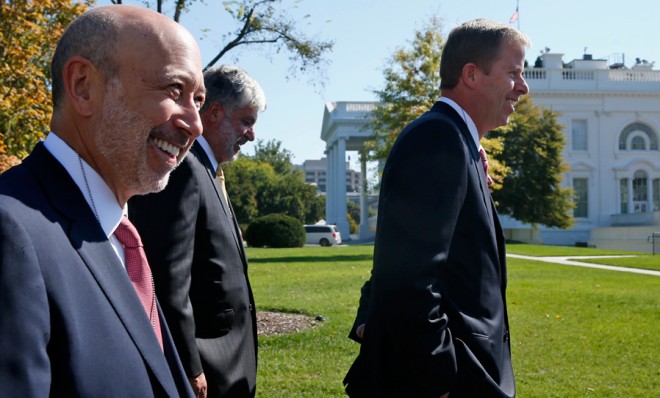Obama's new ally in the government shutdown fight: Big business
The Ted Cruz Caucus just got a little more lonely


A free daily email with the biggest news stories of the day – and the best features from TheWeek.com
You are now subscribed
Your newsletter sign-up was successful
The GOP has traditionally been the party of big business. Just ask Mitt Romney, who cast himself in 2012 as a successful businessmen and friend to Wall Street and small business owners.
But now, with the government shutdown threatening to kneecap the limping economy, big business interests are clamoring for Republicans to back down and pass a budget with no delay-ObamaCare strings attached.
On Wednesday, President Obama and Vice President Biden will meet with the Financial Services Forum, a consortium of 19 executives from the nation's top banks, to discuss "a broad array of economic issues, including the need for Congress to act to pay its bills and raise the debt ceiling and avoid disastrous impacts on our economy." The group includes Wall Street titans like JPMorgan CEO Jamie Dimon and Goldman Sachs boss Lloyd Blankfein, as well as others from Bank of America, Citigroup, and Morgan Stanley.
The Week
Escape your echo chamber. Get the facts behind the news, plus analysis from multiple perspectives.

Sign up for The Week's Free Newsletters
From our morning news briefing to a weekly Good News Newsletter, get the best of The Week delivered directly to your inbox.
From our morning news briefing to a weekly Good News Newsletter, get the best of The Week delivered directly to your inbox.
Though the group itself has not publicly criticized Republicans, Blankfein told CNN last week that GOP threats to tank the economy were "poor policy and just a poor demonstration" that was already having "adverse" effects on the economy.
The U.S. Chamber of Commerce, a heavyweight GOP donor that has called for a repeal of ObamaCare, has gone further, directly urging Republicans to throw in the towel. The Chamber and 251 allied interests on Monday signed a letter urging Congress to avoid a shutdown and "expeditiously" raise the debt limit. While saying that they, too, wanted significant spending cuts, they argued that it was more important to first keep the government running before trying to obtain such cuts.
"[W]ith the U.S. economy continuing to underperform, the federal government needs to maintain its normal operations pending a successful outcome of broader budgetary reforms," the Chamber wrote. "It is not in the best interest of the employers, employees or the American people to risk a government shutdown that will be economically disruptive and create even more uncertainties for the U.S. economy."
The Chamber's support was notable, because the group has spent millions to help Republicans in past elections. In the last election cycle alone, the group spent $28 million lobbying against Democrats, and another $3 million boosting Republicans, according to Open Secrets.
A free daily email with the biggest news stories of the day – and the best features from TheWeek.com
Big business' calls have, for now, gone unheeded as Republicans continue to squabble among themselves. The unresponsiveness has underscored how the right wing of the GOP is now more beholden to Tea Party-aligned interests than traditional corporate groups. Sen. Ted Cruz (R-Texas), for instance, won his 2012 Senate campaign with the help of thousands of dollars in donations from FreedomWorks for America and the Senate Conservatives Fund, the latter of which called congressional Republicans who broke with Cruz "turncoats" who had "surrendered to Obama."
"There is an element of the more independent, Tea Party coalition Republicans that, frankly, don't listen to very many people," John Engler, president of the Business Roundtable, told the Associated Press. "They are on a mission, often defined on the basis of their view of the world, and they aren't paying very much attention to what this means beyond maybe their own districts."
Jon Terbush is an associate editor at TheWeek.com covering politics, sports, and other things he finds interesting. He has previously written for Talking Points Memo, Raw Story, and Business Insider.
-
 ‘Those rights don’t exist to protect criminals’
‘Those rights don’t exist to protect criminals’Instant Opinion Opinion, comment and editorials of the day
-
 Key Bangladesh election returns old guard to power
Key Bangladesh election returns old guard to powerSpeed Read The Bangladesh Nationalist Party claimed a decisive victory
-
 Judge blocks Hegseth from punishing Kelly over video
Judge blocks Hegseth from punishing Kelly over videoSpeed Read Defense Secretary Pete Hegseth pushed for the senator to be demoted over a video in which he reminds military officials they should refuse illegal orders
